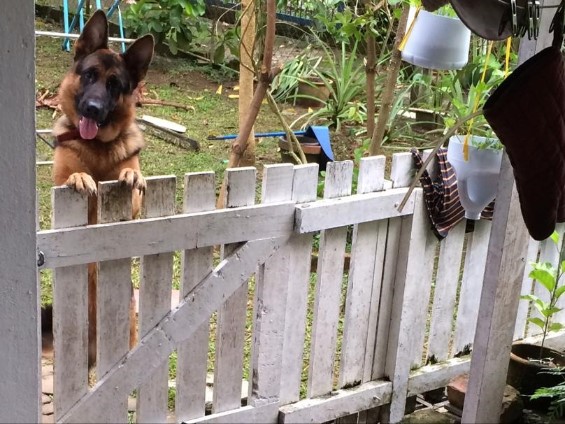At the airport baggage carousel, when a sniffer dog puts his paw on your luggage or on your Hermes bag and refuse to be shooed off, you know you have been found seriously guilty of bringing in forbidden stuff, until proven otherwise.
Trained canine detectives are not easily distracted by your title or a pretty face, nor fooled by the strong smelly stuff smugglers use to camouflage contraband.
Their sense of smell is 2,000X stronger and 50X more sensitive than that of a human. More than 10 years of research by Medical Detection Dogs has shown that dogs can be trained to detect the odour of disease at the equivalent dilution of one teaspoon of sugar in two Olympic-sized swimming pools of water.
Smell — what do dogs have that we don’t? Besides the difference in the structural and airflow dynamics of the nasal passages, there are up to 300 million olfactory receptors in their noses, compared to about six million in us. The part of a dog’s brain devoted to analysing smells is, proportionately, 40 times bigger than ours.
Dogs can be trained to detect explosives, illegal drugs, wildlife, plant pests, bedbugs, currency, blood and contraband electronics, such as illicit mobile phones in prisons.
Specially-Trained Bio-Detection Dogs To Be Used As A Rapid Non-Invasive Test For Covid-19?
On 15 May, the London School of Hygiene and Tropical Medicine (LSHTM) announced that the UK government has awarded £500,000 to its researchers to find out whether dogs can be trained to detect coronavirus, even if people are asymptomatic.
In collaboration with Medical Detection Dogs and Durham University, the first phase will determine whether six bio-detection dogs can be trained to detect coronavirus in humans from odour samples.
Samples will be collected from NHS staff in London hospitals. Working on the presumption that respiratory disease can change body odour, they are hopeful this might be unique to Covid19 and that the bio-detection dogs will be able to identify it with a high degree of accuracy.
The second phase will be to test in real live situations. Following which, more dogs can be trained for deployment to points of entry for the rapid, non-invasive screening of potentially infected people travelling from abroad.
Scientists and veterinarians, working with the team, currently believe that it is completely safe for dogs to perform this duty. The dogs will be trained on non-infectious samples and will not need to make contact with the individuals they are screening.
Dogs Can Sniff Out Cancer?
The first published report on the use of sniffer dogs in the diagnosis of malignant melanoma was in 1989 by Williams and Pembroke. Since then, studies have reported on the canine detection of bladder, lung, breast, skin, ovarian cancers in the search for a diagnostic tool that can pick up cancers early.
In 2001, Church and Williams reported on a 66-year-old man who developed a patch of eczema which a pet Labrador persistently sniffed. A biopsy revealed basal cell carcinoma.
A detection dog can be trained to sniff out prostate cancer in urine samples instead of making a patient uneasy, being sniffed up and down.
In this Italian study, two 3-year-old female German shepherd explosion detection dogs were trained to identify prostate cancer-specific volatile organic compounds (VOC) in urine samples. They were tested on 362 patients with prostate cancer (low risk to metastatic) and 540 healthy controls. For dog 1, sensitivity was 100% and specificity was 98.7%. For dog 2, sensitivity was 98.6% and specificity was 97.6%.
This is fantastic news since prostate cancer (PC) is the fifth most frequent cancer in the world. Blood PSA (Prostate Specific Antigen) testing has increased PC detection but lacks specificity and accuracy.
High serum PSA levels can be detected in men with non-malignant conditions (false positives). Men with increased PSA values have to undergo invasive biopsy which is prone to complications, including infection and death. The PC detection rate by biopsy is only 30% at the first biopsy.
What do the dogs actually smell in prostate cancer urine — a single odour or mixture of volatile organic compounds?
Is this reproducible? Can other dogs be trained to be as accurate? Can they be used for follow-up? If we can identify the compound, perhaps in the future, synthetic noses can be developed to diagnose prostate cancer without the dog and trainer!
Sniffing Out Malaria
This LSHTM team had previously worked together with Medical Detection Dogs to demonstrate that dogs can be trained to detect odours from humans with malaria infection with extremely high accuracy. This ongoing research with the Medical Research Council Unit, The Gambia, is funded by the Bill & Melinda Gates Foundation.
By using nylon socks, foot-odour samples and finger-prick blood samples (to detect malaria parasite Plasmodium falciparum) were collected from healthy children in Gambia.
Two dogs which had been trained to distinguish between the scent of those infected with malaria parasites and healthy samples were used. From the socks, they were able to correctly identify 70% of the malaria-infected samples and 90% of the non-infected samples.
Further research is required to see if dogs can directly sniff out malaria-infected but otherwise healthy people, including people from other parts of the world (with different body odours?).
Sniffing Covid-19 Persons – Safe For Dogs? (Unmasked, No PPE?)

Animal advocates, especially dog lovers will want to know — sniffing urine or smelly socks or cancer patients may be okay, but is it really safe for the expensively trained bio-detection dogs to be sniffing hundreds of potentially infected Covid-19 persons at airports or ports of entry? What is their accuracy from 6 feet safe-social distancing?
The First Confirmed Case Of A Dog Contracting SARS-CoV-2 In USA
On 2 June, the United States Department of Agriculture announced the first confirmed case of SARS-CoV-2 infection in a pet German shepherd in New York state. One of the dog’s owners had tested positive and another showed symptoms consistent for Covid-19.
When the dog showed signs of respiratory illness, samples were taken. The dog is expected to make a full recovery. A second dog in the household had shown no signs of illness but has antibodies, suggesting exposure.
The World Organisation for Animal Health (OIE) considers SARS-CoV-2 an emerging disease, and all confirmed animal infections must be reported to the OIE.
Confirmed Cases of SARS-CoV-2 in Animals in USA
As of 5 June, three lions (first lion positive 15th April) , five tigers (first tiger 4th April) all at the Bronx Zoo in New York, four cats and one dog (2nd dog in house with antibodies) have tested positive. The big cats, which tested positive in April, were thought to have contracted the coronavirus from an infected but asymptomatic unidentified zookeeper. The cats have made a full recovery.
Take-Home Message
- The knowledge about SARS-CoV-2 in animals is limited and evolving. There is currently no evidence that animals play a significant role in spreading the virus. The risk of animals spreading the virus to people is considered to be low.
- People with Covid-19 can spread the virus to animals during close contact. Suspected or confirmed cases should avoid contact with pets and other animals to protect them from possible infection.
- There is no justification in taking measures against companion animals that may compromise their welfare.
- For more information about Covid-19 and animals and recommendations for pet owners, visit the CDC.
Orang Utan Sanctuary — Keep It A Covid-Free Zone
Custodians, who have been doing such a great job in caring for them, please take special care to screen staff or visitors or maintenance agents for fever, cough or contact with Covid or travel.
Be particularly strict about masking, social distancing and disposal of contaminated masks litter! No apologies for rejecting sick visitors.
Zookeepers around the country (USA) have been making extra efforts to protect great apes in their care, as great apes can easily catch respiratory illnesses from humans. Experts have warned that they may be particularly susceptible to coronavirus.

A fusion opinion from a Sarawakian public health specialist, paediatrician, ex-associate professor, disaster relief and medical volunteer, passionate about helping people learn.
- This is the personal opinion of the writer or publication and does not necessarily represent the views of CodeBlue.








